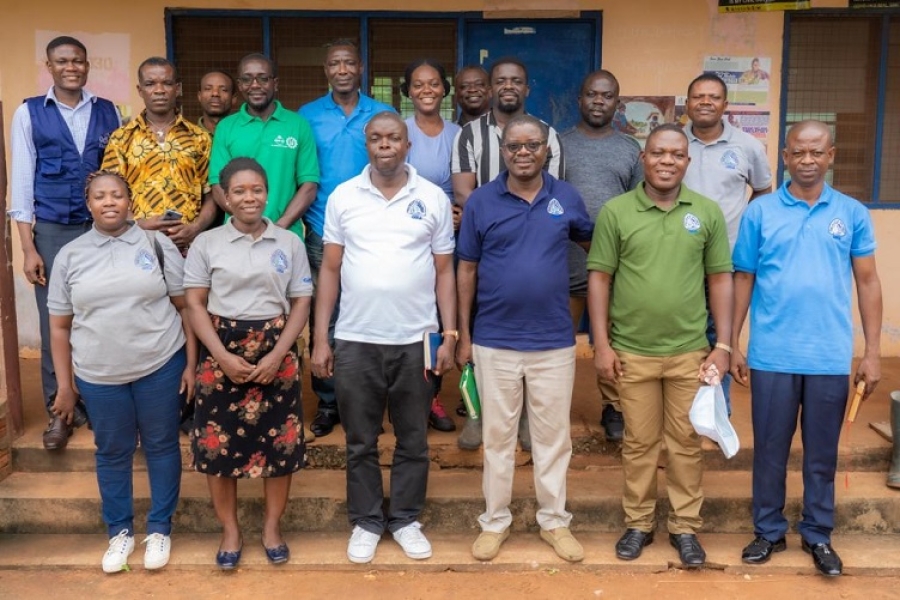The Ag. Chief Executive of the Ghana Irrigation Development Authority (GIDA), Ing. Richard Oppong-Boateng said the Weta Irrigation Scheme (WIS), is poised to play a pivotal role in revolutionizing rice production and driving Agricultural transformation in Ghana.
He made this known when the Authority paid a two-day working visit to the Weta irrigation scheme project in the Volta Region on Thursday, June 1, 2023 to address the challenges in a bid to spearhead and enhance rice production and reduce imports.
Speaking to Agroriches News, Ing. Oppong-Boateng said the Authority aims at strengthening the Weta irrigation scheme, empowering it to enhance domestic rice yields, guarantee food security, and establish a sustainable Agricultural landscape for the Country.
“Ghana should expect an improvement in domestic rice production. With the demo fields and capacity building of the farmers, I am sure we would have the whole area put under cultivation, the yields and production levels should go up,” he said.
“Weta is one of the vibrant rice producing schemes in the country, so if we are able to fix the challenges, rice farmers can be able to upscale rice production, hence Ghana should expect massive rice production in the coming years,” he added.
The Authority is implementing various measures to strengthen the scheme, including desilting and reshaping drains, clearing vegetation from dam slopes, deploying performance monitoring devices, developing land, extending the main canal, reclaiming of flooded areas of 105 hectares, automation of canals and intake gates, provision of hybrid solar-green energy to the intake gates, dewatering pump station, and several other initiatives.
He mentioned that the Government of Ghana has selected the Weta Irrigation Scheme for refurbishment under the Food System Resilience Program (FSRP) funded by the World Bank, following a recommendation from the Authority.
Speaking on another crucial component to improve the scheme, he indicated that the Food System Resilience Program (FSRP), funded by the World Bank and implemented by the Government of Ghana has selected the Weta Irrigation Scheme for rehabilitation to increase crop productivity.
According to him, the GIDA-Technical Supervision Team, operating within the framework of the FSRP, will supervise the rehabilitation of the irrigation scheme with the aim of boosting crop productivity.
He expressed optimism that the collective efforts of rice cultivation centers in the inland valleys, including Weta, will enable Ghana to meet its demand of about 1.5 million metric tonnes of rice through this intervention.
Touching on the current state of rice production in the country, he noted that Ghana's current rice production stands at 600,000 metric tonnes, resulting in a significant deficit of 900,000 metric tonnes.
He reiterated with emphasis that the Authority, in collaboration with developmental partners such as the Japan International Corporation Agency (JICA) and the Jospong Group, will undertake significant transformative measures to scale up rice production.
In an analysis of rice cultivation in Ghana under the various schemes, the Ag. Chief Executive said, “Averagely, under the irrigation schemes, we are doing about 5 tons per hectare, a maximum of 7 tons per hectare, and a minimum of 3 tons per hectare."
Commenting on the irrigable area, a crucial factor in determining commodity demand, he highlighted, "Under gravity, we have about 28,000 hectares. So, if you add the inland valleys where our farmers practice single cropping in regions such as Ashanti, Bono East, Bono, Volta, Central, Western, Western North, Oti, Savannah, North East, Upper West, Upper East and Northern Regions there exists substantial potential for rice cultivation."
“In fact, there are over 300,000 hectares inland Valleys identified for rice production. These areas alone if put under full scale rice production can give us 1.8 million metric tons, surplus of 300,000 metric tons,” he said.
Furthermore, he added that the Authority intends to facilitate land development for smallholder farmers, emphasizing the necessity of government and private organizations' support in achieving this goal.
He stated that once the land has been developed, farmers will simply require farm inputs, seeds, and training in good agronomic practices.
During an interview with Samuel Kumi, the Ag. Scheme Manager at the Weta Irrigation Scheme, it was revealed that the scheme, catering to 23 communities in the area, has generated numerous employment opportunities across the entire value chain.
These opportunities span from farmers and aggregators to processors and distributors, showcasing the scheme's positive impact on the local workforce.
He revealed that about 5,000 indirect jobs has been created from the scheme with 1,095 being farmers.
Out of the 1,095 farmers, Mr. Kumi disclosed that 74% of these farmers are men with the remaining 26% being women.
He however lauded the state of mechanization at the scheme, saying it contributes to rice yields in the country.
During the visit by the Authority, farmers in the community were sighted undergoing training on rice cultivation.
Background of the Weta Irrigation Scheme
Constructed in the late seventies in the Ketu-North District of the Volta Region, the scheme is situated approximately 1km away from the Accra-Aflao trunk road in Avalavi. This joint venture project was developed through collaboration between the Russian and Chinese Governments. Comprising two dams, the Agali dam was constructed by the Russians in 1992, while the larger Kplikpa dam was built by the Chinese government from 1978 to 1982. The irrigation delivery system operates on a conventional gravity system, featuring metal gates and offtake water control towers.


